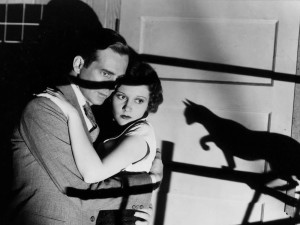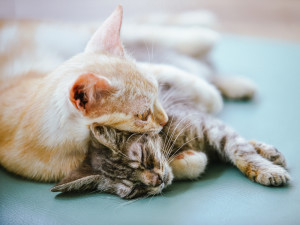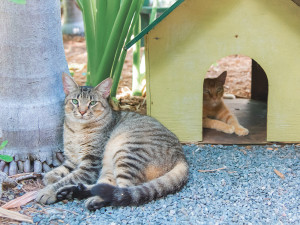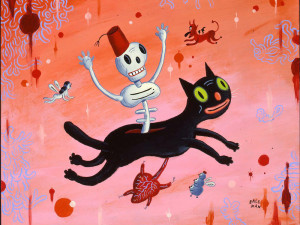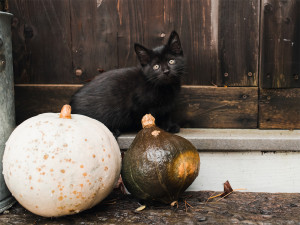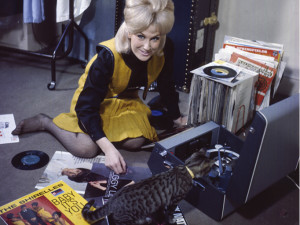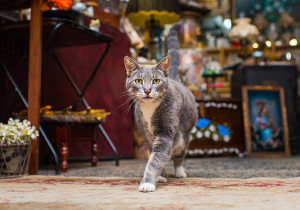Black Cats: Good Luck Charms or Bad Omens?
This Halloween season, let’s dispel some silly superstitions that haunt these kitties.

Share Article
Halloween is the season of the black cat — and they deserve to be celebrated. Black cats are gorgeous and no saltier (or sweeter) than any other cat. And yet, they take longer to get adopted, no thanks to the negative associations that surround them like a toxic fog: They’re evil; they’re bad luck; they cavort with Satan! (Rude!)
Many of the spookier beliefs around black cats are thought to have originated in the Middle Ages in Europe. During the 13th century, the Catholic Church even claimed that black cats were an incarnation of Satan, as documented in written documents issued by Pope Gregory IX, which only contributed to the distrust and superstitions surrounding these beautiful kitties. Cats were then sometimes blamed for the spread of the bubonic plague, which led people to kill cats of every color, but especially black cats. Ironically, fewer cats meant the plague spread faster (there was no one around to control the disease-spreading rat population). In fact, this superstition continued into the 19th century, when black cats were often killed during times of plague.

Get (totally free) deals for food, treats, accessories, tech, and way more pet parenting must-haves.
opens in a new tabToday, black cats are most commonly seen as pets, but in North America, the idea that black cats are bad luck still endures. But there has been a growing movement in recent years to debunk this myth and celebrate black cats as loving pets and companions. In fact, black is the most common color of cat because the black fur gene is the most dominant, especially in males. With so many black cats out in the world, adopting them is critical to reducing shelter and rescue populations. Plus, black cats deserve loving homes just as much as any other cat.
Sure, most superstitions in general are laughable. But, to be fair, not all superstitions surrounding black cats are bad. In some parts of the world, black cats are actually considered good luck. In others, it’s more circumstantial. Let’s break it down — and please, consider adopting a black cat.
America: Bad luck
Blame it on the Pilgrims. Those people came to America with a zeal for the Bible and heaps of superstitions, including the belief that cats — particularly black cats — were witches’ familiars, witches in disguise, and/or the shape-shifting minions of the cloven-hoofed one himself. These days, we know (most of us) that the Pilgrims were very off the mark when it came to reality (hello, Salem witch trials). But the historical precedent they established for discriminating against cats continues in popular media today. Black cats are also inextricably linked to Halloween and found on all manner of decorations, often rearing up and hissing menacingly. Not exactly a warm and cuddly image.
England: Bad luck (mostly)
Given that the Pilgrims came from England, it should come as no surprise that negative associations with black cats dominated there as well. But the idea that black cats were in league with the devil was hardly universal. In fact, English and Irish sailors considered black cats to be good luck and welcomed them aboard their ships as mousers. The wives of these sailors would sometimes even keep a black cat at home, believing they would help bring their husbands home safely.
Interestingly, pirates appear to have had a somewhat more complex view of the relationship between cats and the sea. For them, a black cat walking toward you was bad luck, but one walking away from you was good luck — unless that cat was disembarking from a ship, in which case the whole thing was doomed to sink.
Scotland: Good and bad luck
England’s neighbor to the north also appears to have had a somewhat fraught relationship with black cats. Celtic folklore tells of a faerie creature called the Cat Sith — a large black cat with a white patch on its chest — who was said to stalk the Scottish Highlands and steal the souls of the dead by walking across their bodies before they had been properly buried. But a more modern Scottish superstition says that a black cat appearing on your doorstep is a sign of future prosperity. Let’s go with that one.
Wales: Good luck
The associations probably aren’t all good — after all, you can’t be that close to the Brits and not be touched by at least some of their black cat bias. But there is a Welsh folkloric tradition that says black cats are good for keeping disease away from the home.
Mainland Europe: Bad luck
Let’s blame this one on a combination of Satanic hysteria and the rise of the bubonic plague. As previously mentioned, in the 14th century, the Black Death arrived in Europe from Asia and decimated the population. Unaware that the plague was transmitted by fleas and desperate for a scapegoat, many Europeans blamed cats — particularly black ones — saying they were sent by Satan to spread the disease.
The irony of this was that while cats could, indeed, host fleas, they were also an effective weapon against the rodents that the fleas liked best. So, when people started culling cats, they were just dooming themselves. Humans. The irony of Europeans associating cats with disease is made even richer when we consider that, according to researchers at the National Institutes of Healthopens in a new tab, the genetic mutations that cause cats to have black coats may actually offer protection from certain diseases.
Egypt: Good luck
Long before Europeans started blaming all their woes on cats, the Ancient Egyptians were worshipping black cats like gods. Sort of. The goddess Bastet, daughter of Re, the sun god, was often depicted as having the body of a woman and the head of a beautiful black cat. Bastet was believed to banish threats and evil spirits and protect the home from disease. As a result, black cats were often kept as pets.
In conclusion, black cats are neither good nor bad luck. Because even if luck did exist, cats — black or otherwise — certainly wouldn’t be responsible for it. Cats are responsible for the hair on your clothes and the bad smells coming from the litter box, and that’s about it. So, if you have a black cat, give them a little extra love today, and if you don’t, consider adopting one — shelters are full of them, and they are no less worthy of a home than their lighter-hewed counterparts.

Charles Manning
Charles Manning is an actor, writer, and fashion/media consultant living in New York City with his two cats, Pumpkin and Bear. Follow him on Instagram @charlesemanningopens in a new tab.

Savannah Admire
Savannah Admire is a writer, poet, and pet mom to three dogs and a cat. She currently lives in Western Maryland. When she’s not writing, you can find her reading, taking photos, or volunteering as a content creator for her local community theatre. Her debut poetry book, Mother Viper, is due out August 12, 2025, and you can follow her on Instagram at @savannahcooperpoetopens in a new tab.
Related articles
![Hemingway cat at hemingway Home and Museum in Key West]() opens in a new tab
opens in a new tab6 Facts About Polydactyl Cats
What makes the fabled ‘Hemingway cats’ so special.
![Painting of skeleton riding cat with heart below]() opens in a new tab
opens in a new tabArtist Gary Baseman on Late Cat Blackie & New Kitten Bosko
“Blackie was a friend and a collaborator. I never saw him as a pet and I don’t see Bosko as one either — they are family members.”
![Black kitten sitting outside with pumpkins]() opens in a new tab
opens in a new tabHow to Give Your Cat a Halloween That Won’t Make Them Hiss
Cats might be a symbol of Halloween, but that’s as far as they want it to go.
![Dusty Springfield sitting on the floor with a record player and a cat]() opens in a new tab
opens in a new tabMust Read: Queer Icons and Their Cats
Striking photographs and captivating anecdotes about LGBTQ+ trailblazers and their feline friends, from Freddie Mercury and Janis Joplin to Alison Bechdel and Tig Notaro.
![Gray cat walking through an antique shop]() opens in a new tab
opens in a new tabA Cat Lover’s Guide to NYC
A cat-friendly guide to cafés, spas, shops, and hotels that’d make anyone purr.
